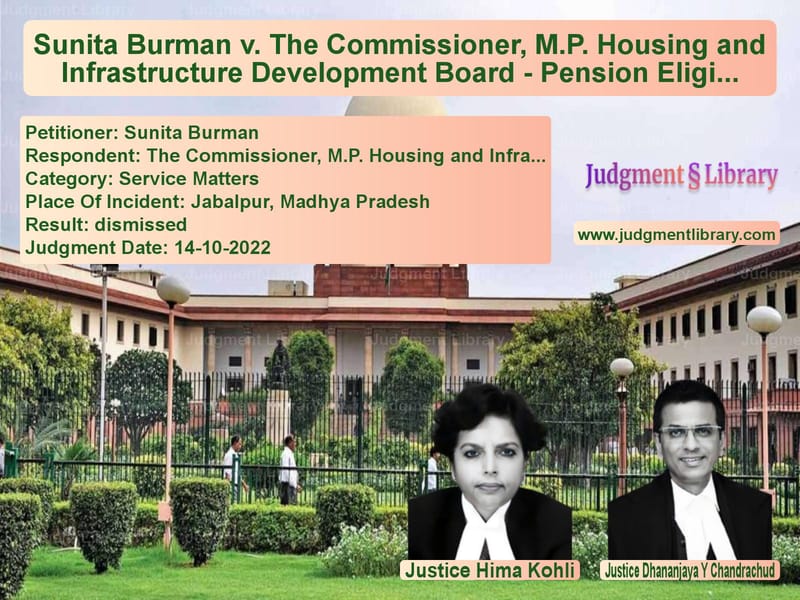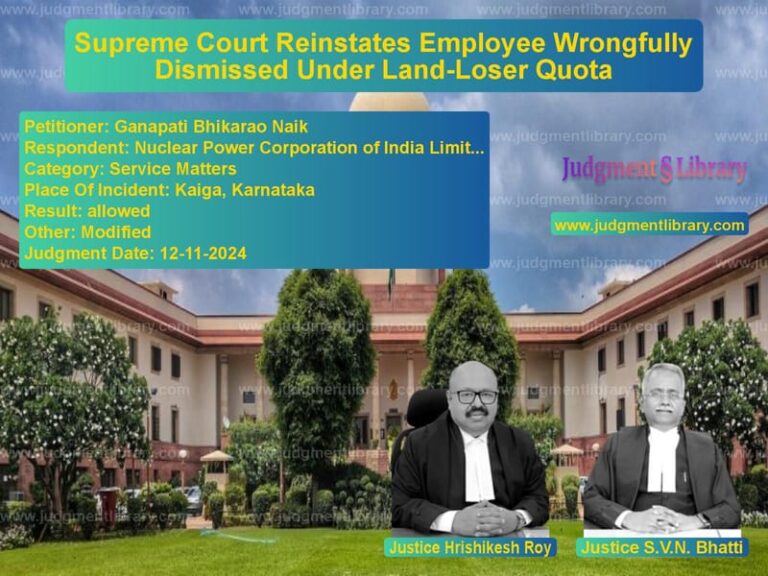Sunita Burman v. The Commissioner, M.P. Housing and Infrastructure Development Board – Pension Eligibility of Work Charged Employees
The appellant, Sunita Burman, the widow of Late Munna Lal Burman, is seeking pension and other retiral dues following the death of her husband, who was employed by the M.P. Housing and Infrastructure Development Board. The case revolves around the question of whether her late husband, a work-charged employee, was entitled to pension benefits under the M.P. Housing and Infrastructure Development Board regulations. The appellant argues that her husband should have been eligible for family pension and other retirement benefits, while the respondent claims that no such entitlement exists for work-charged employees under the applicable regulations.
The facts of the case are as follows: Munna Lal Burman was employed by the Housing Board in 1977 as a Muster Roll employee on daily wages and was later regularized in 1997. Following his death in 2016, Sunita Burman applied for family pension and other dues, but her requests were denied on the grounds that the work-charged establishment employees were not entitled to pension benefits. After the denial, Sunita Burman filed a writ petition before the High Court, which was initially decided in her favor by a Single Judge. However, the Division Bench of the High Court reversed the decision, leading to the current appeal in the Supreme Court.
Petitioner and Respondent Arguments
Petitioner’s Arguments:
- The appellant’s counsel, Mr. S.K. Gangele, argued that the late Munna Lal Burman had been regularized and was a part of the Housing Board’s work-charged establishment. He contended that Regulation 5(d) of the M.P. Griha Nirman Mandal Regulations, 1998, provided for pension/family pension to employees in the regular establishment and that the deceased should have been entitled to such benefits. The appellant also relied on an office order issued in 1997 that indicated her husband was considered a regular employee in the Housing Board and should therefore be entitled to pension and other retirement benefits.
- The appellant’s counsel also referred to the decision in the case of Prem Singh v. State of Uttar Pradesh, arguing that the principle established in that case should apply to this situation, allowing the appellant to claim pension benefits despite her husband’s employment in a work-charged capacity.
Respondent’s Arguments:
- The respondent’s counsel, Mr. R.C. Mishra, argued that the deceased employee, Munna Lal Burman, was not a regular employee and had not been regularized until the time of his death. The respondent stated that the deceased employee had remained a work-charged employee throughout his service with the Housing Board. According to the respondent, work-charged employees were not entitled to pension benefits under the M.P. Housing and Infrastructure Development Board’s regulations, and no pension was applicable to them.
- The respondent also cited the office order dated 2nd July 2015, which provided the option for work-charged employees to opt for pension under the National Pension Scheme (NPS). The deceased had not availed of this option, and therefore, the respondent argued, the appellant was not entitled to any pension benefits.
Key Issues and Supreme Court’s Ruling
The primary issue in this case was whether the appellant’s late husband, as a work-charged employee, was entitled to pension benefits. The key legal questions were centered around the interpretation of the M.P. Housing and Infrastructure Development Board’s regulations and whether the deceased employee’s status as a work-charged employee affected his entitlement to family pension.
1. Regularization of Employment
The Supreme Court considered whether the appellant’s late husband had been regularized and whether this regularization would make him eligible for pension benefits. The appellant claimed that her husband had been regularized in 1997 and thus should be treated as a regular employee entitled to pension benefits. However, the Court found that while the appellant’s husband had been regularized, he had remained a work-charged employee, and his services had not been extended to a regular pensionable position. The Court held that regularization did not automatically qualify the deceased for pension benefits, as the regulations for pension under the M.P. Housing and Infrastructure Development Board did not apply to work-charged employees.
2. Applicability of Pension Regulations
The Court examined the M.P. Griha Nirman Mandal Regulations, 1998, and the M.P. Housing and Infrastructure Development Board’s 2015 regulations. It was found that the pension rules were not applicable to work-charged employees and that the M.P. Housing Board had adopted the National Pension Scheme (NPS) for its work-charged employees, effective from 1st May 2009. However, the deceased employee had not opted into the NPS, further strengthening the respondent’s case that no pension was due to the appellant.
3. National Pension Scheme (NPS)
The Court highlighted the NPS’s provision for work-charged employees and noted that employees who opted for the NPS were entitled to pension benefits. The deceased employee had not exercised the option to join the NPS, and as such, the appellant could not claim pension benefits posthumously. The Court observed that the appellant’s husband had been offered the NPS option in 2015, which he had declined, and this refusal to opt into the pension scheme meant that the appellant was not entitled to any pension.
Conclusion
The Supreme Court concluded that the appellant’s late husband had not been regularized as a pensionable employee, and therefore, the appellant was not entitled to receive family pension from the M.P. Housing and Infrastructure Development Board. The Court emphasized the importance of the NPS and the option provided to work-charged employees to join the pension scheme, which the deceased had not availed of. The Court upheld the Division Bench’s judgment, dismissing the appeal.
This case reaffirms the importance of the specific rules and regulations governing pension schemes for work-charged employees and clarifies that the mere regularization of service does not automatically entitle employees to pension benefits unless they meet the eligibility criteria under the applicable pension schemes.
Impact and Implications
The ruling has significant implications for the eligibility of work-charged employees to receive pension benefits, particularly in statutory bodies such as the M.P. Housing and Infrastructure Development Board. The judgment underscores the need for employees to actively opt into pension schemes like the NPS to avail of benefits and highlights the legal importance of adhering to the regulatory provisions governing such schemes.
Petitioner Name: Sunita Burman.Respondent Name: The Commissioner, M.P. Housing and Infrastructure Development Board.Judgment By: Justice Hima Kohli, Justice Dhananjaya Y Chandrachud.Place Of Incident: Jabalpur, Madhya Pradesh.Judgment Date: 14-10-2022.
Don’t miss out on the full details! Download the complete judgment in PDF format below and gain valuable insights instantly!
Download Judgment: sunita-burman-vs-the-commissioner,-m.-supreme-court-of-india-judgment-dated-14-10-2022.pdf
Directly Download Judgment: Directly download this Judgment
See all petitions in Pension and Gratuity
See all petitions in Public Sector Employees
See all petitions in Employment Disputes
See all petitions in Workplace Harassment
See all petitions in Judgment by Hima Kohli
See all petitions in Judgment by Dhananjaya Y Chandrachud
See all petitions in dismissed
See all petitions in supreme court of India judgments October 2022
See all petitions in 2022 judgments
See all posts in Service Matters Category
See all allowed petitions in Service Matters Category
See all Dismissed petitions in Service Matters Category
See all partially allowed petitions in Service Matters Category







